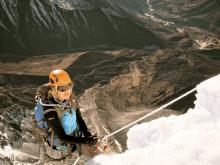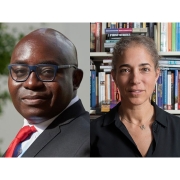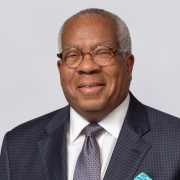Magazine: The Sky is the Limit

Determination is nothing new to Desiree Dubon, C’00, W’00, WG’05, a real estate asset manager who triple-majored in international studies, French and finance in the Huntsman Program in International Studies and Business. Over the last eight years, she’s scaled high-altitude peaks on five continents, becoming the first American woman to summit Nepal’s Manaslu, the eighth-highest mountain in the world, in 2009.
Q: How did you get involved in high-altitude climbing?
Dubon: While I was a student at Penn, I joined a Leadership Venture to climb Mt. Kilimanjaro, and that was my first high-altitude climb. It’s not something I had ever thought about doing, but I really enjoyed the experience. I’d never been to Africa. I’d never climbed a mountain, so I wanted to try to do it. Since 2007, I’ve done at least one big expedition a year.
Q: What has been your most challenging climb?
Dubon: My last climb was on Ama Dablam which is a technical peak above 22,000 feet in the Himalaya in Eastern Nepal. It was a month-long expedition and particularly exciting. It was the furthest I’ve been from my comfort zone, and I had to manage my fear. You’re climbing rock or ice most of the time, and the exposure is pretty much constant and unrelenting. It was definitely unforgettable though. From the summit you can see some of the highest and most dramatic mountains in the world. You’re looking at Everest, Cho Oyu, Lhotse, Shishapangma, Makalu, all these incredible peaks.
Q: How do you prepare for something like that?
Dubon: The best way to train is to climb other mountains. Breathing at altitude is more involved, and your heart rate’s definitely elevated, so cardio is really important. I work with a trainer, and I run a lot. As far as the mental aspect of it, you can’t necessarily prepare for that part.
Q: Even with the best preparation, things don’t always go as planned; what then?
Dubon: In the mountains, a lot of things can go wrong. There’s weather, accidents, human error. Many people don’t plan well or have contingencies in place. When I was in Peru climbing Alpamayo in 2010, the day after we summited, someone came to our tent at four or five in the morning to tell us there’d been an accident. An Argentinian climber had fallen from high on the route and died. As he fell, he seriously injured three Austrians climbing below him. One climber had sustained a broken back and had to be stabilized and carried down the mountain. So my team decided to give up our attempt on the next peak, Quitaraju and shift into executing a rescue. You’d be amazed at how much effort and how many people it takes to do something like that. It involved rope lowers on steep ice pitches, traverses over vast crevasses and negotiating rock slabs and boulder fields. It took about 25 people and over 18 hours to get him down from high camp. We were relieved to learn he had no damage to his spinal cord after all that. It definitely makes you think about the risk of what you’re doing.
Q: What else has climbing taught you?
Dubon: Discipline and humility. I think you discover who you are when you’re that challenged. It’s definitely been life-changing for me. It teaches you patience, mental focus and determination, just pushing past when you think you’re at your limit. And you’re certainly looking at the world from a very different place. You think about where you are and where you come from and how different things are. It changes how you look at things.
Q: Where next?
Dubon: I haven’t decided. I’ve thought about going back to the Alps. I’d like to climb the Matterhorn. When I climbed in the Alps a few years ago, I was hoping to climb Mt. Blanc and the Matterhorn and the Eiger, but we had really bad weather. Although it was summer, the Matterhorn was iced out. It’s such an iconic, beautiful mountain, I really want to go back and climb it. I’ve also thought about doing more climbing in the states, maybe in the Tetons.





